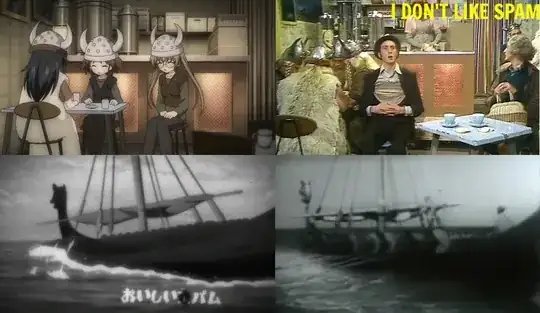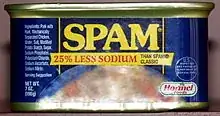On OVA episode 2, when all the girls went camping, Yukari showed her collection, rations from different countries, some of Rabbit Team girls started to yell *pam, *pam, *pam, which is I guess come from word spam. But why they censored the word? How could it become something like "eggs, bacon, sausage, and spam"?
2 Answers
Apparently, it's a parody from a popular Monty Python sketch titled "Spam". It's about two customers who order a breakfast from a menu that includes Spam in almost every dish.
As usual, a lot of other shows also have to censored some brand or replace it with similar names to the real-life brand, so that the producers can avoid copyright issues. Some other show also tend to censored part of the show if it's a parody to other show for same reason.
This is a video from Girls und Panzer OVA 2 and Monty Python - Spam
And this is a picture for comparison in case if the video is removed:

Spam is actually used as military food in World War II.
Spam is a brand of several canned precooked meat products made by the Hormel Foods Corporation. It was first introduced in 1937 and gained popularity worldwide after its use during World War II.(1)

Spam was used by U.S. military occupation after World War II into Guam, Hawaii, Okinawa, the Philippine Islands, and other islands in the Pacific as one of their military food.
The term spam in the context of electronic communications is derived from this sketch.(2)
Sources:
- 19,125
- 46
- 122
- 229
-
3The does not address the question why the word **spam** was censored. – Paulie_D Nov 19 '14 at 16:06
-
1@Paulie_D because it's a parody and a brand, I thought everyone should know that already.. – Darjeeling Nov 19 '14 at 23:29
-
@Paulie_D I'd imagine it would have something to do with legal issues see Phillip's answer and Oshino's comment above – user2716766 Nov 19 '14 at 23:30
SPAM® is a registered trademark by the Hormel Foods Corporation.
As you might have noticed from other productions, Anime usually change or censor any real-world trademarks which appear.
They do this:
- to avoid legal trouble with trademark owners should they consider their brand misrepresented
- to not give something away for free which they might get paid for
- 449
- 3
- 10